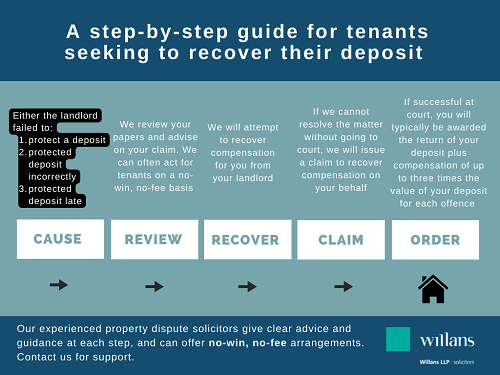Tenancy deposit claims: A complete guide for tenants

At Willans our experienced lawyers provide specialist advice and expertise on claims relating to tenancy deposits to help tenants with recovering compensation owed to them.
In this guide we answer some questions commonly asked by tenants as well as take you through the process of how we can help if you are faced with a deposit protection scheme dispute.
Our lawyers have many years’ experience in making tenancy deposit compensation claims and in some cases can act on a no-win, no-fee basis. The right guidance will increase your likelihood of making a successful claim and recovering your deposit and any further compensation owing to you, in a timely and cost-effective way.
Need help with a tenancy deposit claim? Contact us for clear guidance.
Contact usFrequently-asked questions about tenancy deposit claims:
Click on the links below to jump to the different questions.
- Does my landlord need to protect my deposit?
- How do I dispute a deposit from my landlord?
- What is the process for making a tenancy deposit claim?
- What if my landlord doesn’t return my deposit?
- How do I get my deposit back?
- My landlord did not provide any ‘prescribed information’, what do I do?
- Can I claim if I moved out of the property some time ago?
- I have been in the same property for a number of years and have renewed my tenancy, how does that impact my claim?
- Can a landlord ask for more money after I’ve moved out?
- Steps we take to help you with a tenancy deposit claim.
Continue reading to find out more, or contact us using the button below if you require advice.
Contact us
Does my landlord need to protect my deposit?
If you occupy a property under an assured shorthold tenancy and you paid a deposit to your landlord, then they are obligated to protect your deposit within a compliant tenancy deposit protection scheme.
If this is not done, or is done incorrectly (such as providing the wrong ‘prescribed information’ or none at all), or is done late (not within 30 days of receiving your deposit from you), then your landlord is likely to be in breach of their deposit protection obligations.
An assured shorthold tenancy is the most commonly used tenancy by private landlords or letting agents. If you are in doubt as to the type of tenancy agreement you have, it is best to check your contract.
If you think that your landlord may have breached their legal obligations, speak to our lawyers for help.
Contact us
How do I dispute a deposit from my landlord?
In the event that your landlord has failed to protect your deposit, or if your deposit hasn’t been suitably protected, you may be entitled to the full return of the deposit, as well as compensation of up to three times the value of your deposit.
Our lawyers are specialists in landlord and tenant disputes and have extensive experience in advising tenants on recovering their deposit and further compensation owing. If you think that you may have a claim against your landlord due to their failure to protect your deposit then in most cases we can help and offer an initial no-obligation consultation to discuss your situation.
Need help resolving a dispute? Get in touch with our experienced lawyers for support.
Contact us
What is the process for making a tenancy deposit claim?
We have put together a step-by-step guide in the infographic below which outlines the process for tenants to follow if they are seeking to recover their deposit as well as any further compensation they may be entitled to.
It starts with a ’cause’ – then moves to the ‘review stage’ where legal experts are best placed to advise on whether you have a claim – the next stage involves trying to ‘recover’ the money from your landlord or relevant tenancy deposit scheme – if the previous steps were unsuccessful at resolving the dispute, then a claim will be brought – the final step involves the court’s decision (an ‘order’) and acting on that order to reach a solution. If the court agrees that your landlord hasn’t followed the correct procedure, it will order your landlord to return your deposit to you or into a relevant tenancy deposit scheme within 14 days, as well as tell your landlord to pay compensation of up to 3 times the amount of your deposit.

Want to get started with process? Our lawyers offer an initial no-obligation phone or video consultation and are ready to help.
Contact us
What if my landlord doesn’t return my deposit?
Your landlord is required to pay your deposit back to you within 10 working days of you both mutually agreeing what is owed to you.
If your deposit was protected, then you need to use the dispute process provided by the relevant scheme which holds your deposit to deal with any dispute over its return.
If your deposit wasn’t protected then you may have a claim against your landlord for the return of your deposit plus compensation of up to three times the value of your deposit for each breach.
If your landlord still won’t respond to you, then you may need to make a further claim to enforce a judgment to recover money set out in the court order.
Having trouble with recovering your deposit? Contact us if you need advice or assistance.
Contact us
How do I get my deposit back?
If your deposit was protected by a relevant tenancy deposit scheme, then you need to follow the relevant guidance from your scheme. However, if your deposit was not protected and your landlord has refused to return it to you, then you may need to bring a claim for the return of your deposit and compensation through the courts.
Receive a call back from our specialist team to help get you started.
Contact us
My landlord did not provide any ‘prescribed information’, what do I do?
If your landlord did not provide the relevant prescribed information then they will need to return your deposit to you, without deduction, regardless of whether or not it was protected.
In addition to this, you may have a claim for compensation of up to three times the value of the deposit for their failure to comply with their deposit protection obligations.
Need further assistance, contact our lawyers to get started.
Contact us
Can I still claim if I moved out of the property some time ago?
Even if you have now moved out of the property you will often be able to bring a claim for your landlord’s past failure to protect your tenancy deposit.
Contact our team for guidance on the matter.
Contact us
I have been in the same property for a number of years and have renewed my tenancy, how does that impact my claim?
If you have renewed your tenancy several times, and the deposit was not protected on each renewal, then your landlord could be liable to pay you compensation for each renewal of your tenancy. This can be as much as up to three times the value of the deposit for each renewal of your tenancy.
We can help you navigate your way through the claims process, get in touch for advice.
Contact us
Can a landlord ask for more money after I’ve moved out?
Yes, if a tenant has caused a lot of damage to a property while they were in tenancy and this damage exceeds their rental deposit, then a landlord is likely to seek compensation to cover the expense. Understandably, this will have a knock-on effect for any tenant wishing to recoup their deposit money.
Steps we take to help you with a tenancy deposit claim:
Our lawyers are specialists in landlord & tenant disputes and have extensive experience in dealing with tenancy deposit claims in particular.
If you think that you may have a claim against your landlord, we can help.
The first step in helping you with your claim is for you to arrange a no-obligation consultation with us. Our lawyers offer an initial telephone or video call of up to 30 minutes to hear about your dispute and offer some guidance to help you decide the best way forward.
Typically, if a landlord has failed to protect your deposit, we will help you claim the recovery of your deposit, compensation and our fees.
What we can do for you:
- Provide an initial no-obligation consultation
- Review your documents and advise on your potential claim
- Prepare a letter of claim seeking to recover your deposit and compensation from your landlord
- Prepare and issue a claim against your landlord, if required to help you recover your deposit plus any compensation owing to you.
If you think that you may have an issue with your deposit, please contact us to arrange an initial consultation to discuss your situation with one of our experienced property dispute lawyers.
In many cases involving deposits, our property dispute team can deal with your claim on a no-win, no-fee basis. If we can’t act on a no-win, no-fee basis we offer a variety of fixed fees and cost estimates to help you progress your matter.
Contact our lawyers to get started.
Contact us
Disclaimer: Please note that this page is for guidance only and does not replace legal advice. Speak to us if you seek advice, we’d be delighted to help you resolve your dispute.
Contact
James Melvin-Bath LLB (Hons)
Senior associate, solicitor-advocate
View profile


Related services
Share this article
Tenants already in situ: which notices should landlords be aware of?
Are you a landlord that’s bought or sold a property with tenants already in occupation? Our team of experts offer guidance on which notices landlords should be aware of. Perhaps…
Bethen Abraham LLB (Hons), LLM
Solicitor

The King’s speech 2023: Changes to the property sector
In November 2023, HM King Charles delivered the King’s speech which set out the government’s planned legislative programme for the coming year. Our litigation specialists summarise the proposed bills that…
Simon Arneaud LLB (Hons)
Senior associate, solicitor

Tenant eviction – a complete guide for residential landlords
Our tenant eviction solicitors provide residential landlords with specialist advice and expertise to help with their rental property. In this guide we take you through the process of how we…
James Melvin-Bath LLB (Hons)
Senior associate, solicitor-advocate









